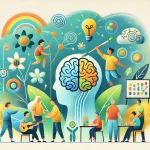Neurodevelopmental disorders are a group of conditions that affect how the brain develops and functions. These disorders typically appear early in life and can impact various aspects of development, such as behavior, learning, social interactions, and motor skills. Let’s explore what neurodevelopmental disorders are, their types, and how they can be managed.
What Are Neurodevelopmental Disorders?
Neurodevelopmental disorders are conditions that stem from atypical development of the nervous system, which includes the brain, spinal cord, and nerves. These disorders often become noticeable in early childhood as children begin to learn, play, and interact with others.While the exact causes vary, a mix of genetic, environmental, and biological factors often contribute to neurodevelopmental disorders. Early diagnosis and support can make a significant difference in improving quality of life.
Common Types of Neurodevelopmental Disorders
- Attention-Deficit/Hyperactivity Disorder (ADHD)
ADHD is characterized by difficulties with focus, hyperactivity, and impulsive behavior. It can affect academic performance, relationships, and daily activities. - Autism Spectrum Disorder (ASD)
ASD includes a range of conditions that affect communication, behavior, and social interactions. Symptoms can vary widely, from mild challenges to more significant support needs. - Learning Disorders
These include difficulties with reading (dyslexia), writing (dysgraphia), or math (dyscalculia). Such disorders are not indicative of intelligence but rather of specific brain processing differences. - Intellectual Developmental Disorder (IDD)
Also known as intellectual disability, IDD involves limitations in intellectual functioning and adaptive behaviors like communication and self-care. - Developmental Coordination Disorder (DCD)
Sometimes called dyspraxia, this disorder affects motor skill development, leading to clumsiness or difficulty with tasks like writing, tying shoelaces, or using tools. - Speech and Language Disorders
These include challenges with articulation, understanding language, or expressing thoughts effectively.
Signs and Symptoms
While symptoms vary depending on the specific disorder, common signs to watch for include:- Delays in reaching developmental milestones (e.g., walking, talking).
- Struggles with learning or focusing.
- Difficulty interacting with peers or adapting to social settings.
- Repetitive behaviors or restricted interests (common in ASD).
- Poor coordination or motor skills.
Causes and Risk Factors
The causes of neurodevelopmental disorders are multifaceted and may include:- Genetics: Family history of certain disorders can increase risk.
- Prenatal Factors: Exposure to infections, toxins, or malnutrition during pregnancy.
- Premature Birth: Higher likelihood of neurodevelopmental challenges.
- Environmental Factors: Stressful or traumatic early-life experiences.
Living with Neurodevelopmental Disorders
While these disorders can present challenges, people with neurodevelopmental conditions often lead fulfilling, successful lives with the right support. Management strategies include:- Therapies: Speech therapy, occupational therapy, or behavioral therapy tailored to individual needs.
- Education Support: Individualized education plans (IEPs) help children thrive in school settings.
- Medications: Used in some cases to manage symptoms like hyperactivity or mood regulation.
- Support Systems: Family, friends, and community resources play a vital role in fostering growth and independence.
Breaking the Stigma
One of the biggest hurdles for individuals with neurodevelopmental disorders is societal stigma. Misunderstandings or lack of awareness can lead to isolation and discrimination.By fostering inclusive communities and educating ourselves about these conditions, we can create a world that embraces diversity and celebrates the unique strengths of every individual.
Neurodevelopmental disorders are a complex but important part of understanding human development. With early intervention, understanding, and a supportive environment, individuals with these conditions can overcome challenges and achieve remarkable things.
If you or someone you know may be affected by a neurodevelopmental disorder, seek advice from a healthcare professional. Awareness and compassion are the first steps toward creating a more inclusive future.
What is ADHD?
Last edited:

